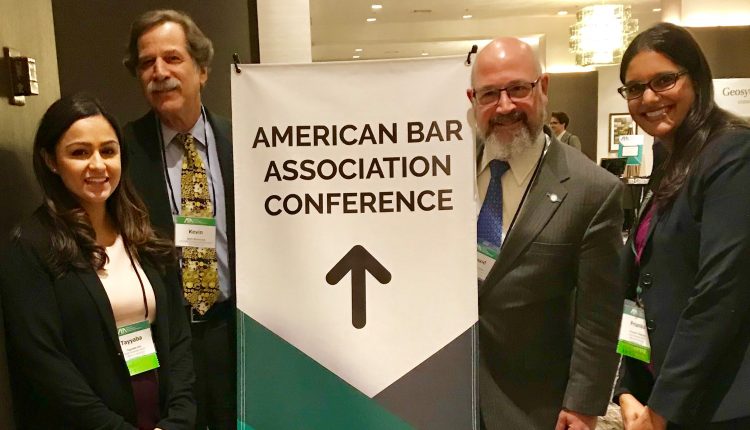
Advocacy Attends ABA Section of Environment, Energy, and Resources’ Annual Conference in Denver, CO
By Prianka Sharma, Assistant Chief Counsel
Last week, Assistant Chief Counsels Kevin Bromberg, David Rostker, Prianka Sharma, and Tabby Waqar Zeb attended the American Bar Association Section on Energy, Environment, and Resources’ annual conference in Denver, Colorado. Among the several panels and keynote speeches that pertained to work at Advocacy, one panel of interest involved streamlining the federal permitting process. Specifically, panelists spoke about the interagency review processes for the National Environmental Policy Act (NEPA) and Section 7 consultation under the Endangered Species Act.
During this panel, attendees heard from a representative of a federal government agency, a private corporation, and a representative of the American Exploration & Mining Association, which is a trade association with many small business members. Currently, there are approximately 16,500 pending mining jobs that are waiting on federal permits in order to continue work. This equates to approximately $9.2 billion that is currently held up in these processes.
In one instance during an interagency consultation, the Army Corps of Engineers asked the Forest Service, the lead agency, a question about a specific location in the project proposal. When the Forest Service relayed the question to the stakeholder, the Forest Service conveyed the wrong location for the question, delaying the permit approval for the project.
Another panelist spoke about how there is no clarity or consensus over who has Endangered Species Act jurisdiction. This is important in determining lead agency roles for Section 7 interagency consultation. Panelists stated that each agency “fights” over this issue.
Panelists spoke about the need for consistency across the various agencies, including the Bureau of Land Management and the Forest Service. They stated that project proponents should be able to engage with the agency early on in the process, and that the cooperating agencies should all be on board with the project up-front in order to make reviews and collaboration more seamless and be able to speak directly with the project proponent.
One suggestion was that there should be parallel tracks for environmental reviews so that duplicative information is not requested and transmitted for each individual review. In addition, agencies should work to align the comment period for the various reviews so that they all start and conclude at the same time, and a record of decision can be made concurrently.
Overall, Advocacy gathered that there was a need for agencies to work through regulation and a need for guidance to streamline these processes. The Assistant Chief Counsels for Advocacy hope to include these suggestions when reviewing current proposed streamlining rules.
Prianka Sharma is an Assistant Chief Counsel for Advocacy whose portfolio includes natural resources, agriculture, and energy. She attended the American Bar Association Section on Energy, Environment, and Resources’ annual conference in Denver, Co., in March. Sharma can be reached at Prianka.Sharma@sba.gov.
